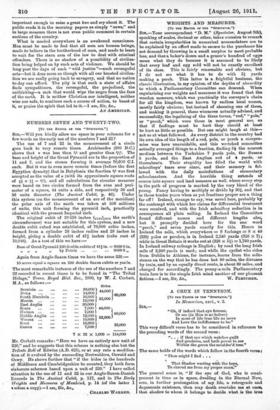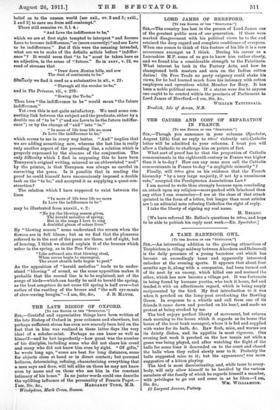A CRUX IN TENNYSON.
[To THE EDITOR OF THE "SPECTATOR."] In Memoriam, xxvi., v. 3.
"Oh, if indeed that eye foresee,
Or see (in Him is no before) In more of life true life no more And Love the indifference to be."
This very difficult verse has to be considered in reference to the preceding words of the second verse :
". . . if that eye which watches guilt And goodness, and hath power to see Within the green the moulder'd tree."
The same holds of the words which follow in the fourth verse: " Then might I find . . .
• That Shadow waiting with the keys, To shroud me from my proper scorn."
The general sense is, " If the eye of God, who is omni- present in time as in space, dwelling in the Eternal Now, sees, in further prolongation of my life, a retrograde and degenerate existence, then may death overtake me at once, that shadow to whom it belongs to decide what is the true belief as to the unseen world [see xxii., vv. 3 and 5; xriii., 1 and 2] to save me from self-contempt."
There still remains vv. 3,1. 4. : "And Love the indifference to be," which we are at first sight tempted to interpret "and foresee Love to become indifferenee,"or (more correctly)"and see Love to be indifference." But if this were the meaning intended, what are we to make of the definite article before "indiffer- ence "P It would seem that "to be" must be taken here as an adjective, in the sense of "future." So in xxxv., v. 12, we read of streams that "Draw down /Eonian hills, and sow
The dust of continents to be."
StmTlarly we find it used as a substantive in xli., v. 23: " Through all the secular to-be," and in The Princess, vii., v. 273: "Sowing the To-be."
Thus here "the indifference to be" would mean "the future indifference."
Yet even this is not quite satisfactory. We need some con- necting link between the subject and the predicate, either by a double use of " to be " (" and see Love to be the future indiffer- ence ") or by the change of " and " into " in."
" In more of life true life no more In Love the indifference to be,"
which seems to me in every way better. "And" implies that we are adding something new, whereas the last line is really only another aspect of the preceding line, a relation which is properly expressed by the absence of the conjunction. The only difficulty which I find in supposing this to have been Tennyson's original writing, misread as an abbreviated " and" by the printer, is that Tennyson was always so careful in correcting the press. Is it possible that in reading the proof he could himself have unconsciously imposed a double task on the " to be," and accepted it as supplying a quasi-con- struction The relation which I have supposed to exist between the lines "In more of life true life no more
In Love the indifference to be "
may be illustrated from xxxviii., v. 2:
"No joy the blowing season gives, The herald melodies of spring, But in the songs I love to sing A doubtful gleam of solace lives."
By "blowing season" some understand the season when the flowers are in full bloom ; but as we find that the pleasures referred to in the rest of the poem are those, not of sight, but of hearing, I think we should explain it of the breezes which usher in the spring, as in the Two Voices:
"Like softened airs that blowing steal, When meres begin to uncongeal,
The sweet church bells began to peal."
As the apposition of "herald melodies" leads us to under- stand " blowing " of sound, so the same apposition makes it probable that the second line is to be explained, not of the songs of birds—which can hardly be said to herald the spring, as the best songsters do not come till spring is half over—but rather of the rustling of the breeze and "the soft eye-music
of slow-waving boughs."—I am, Sir, &c., J. B. MAYOR.



































 Previous page
Previous page